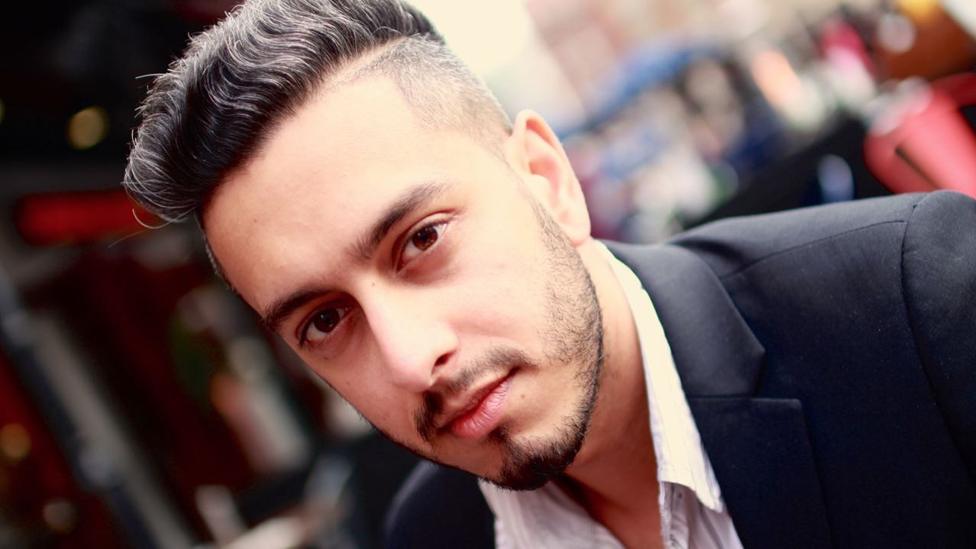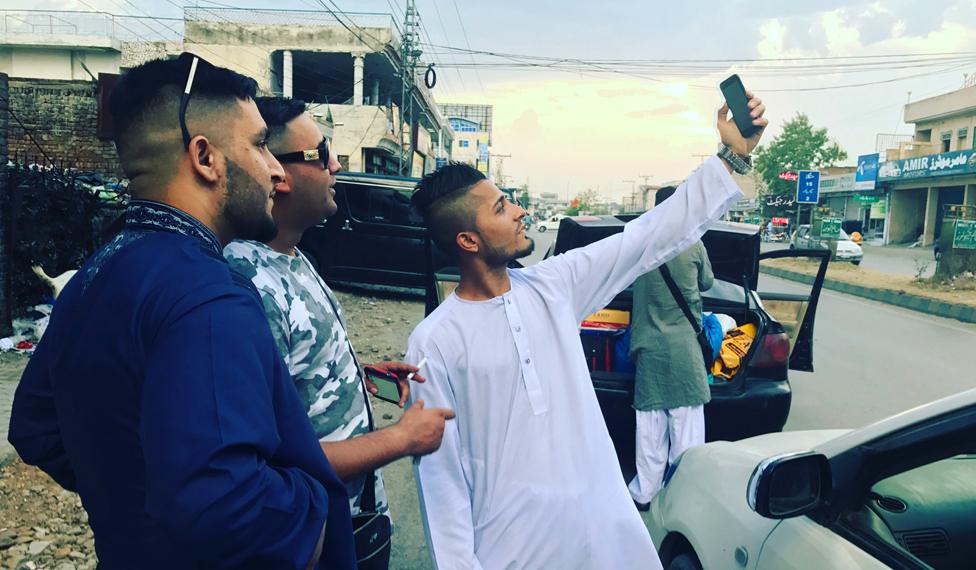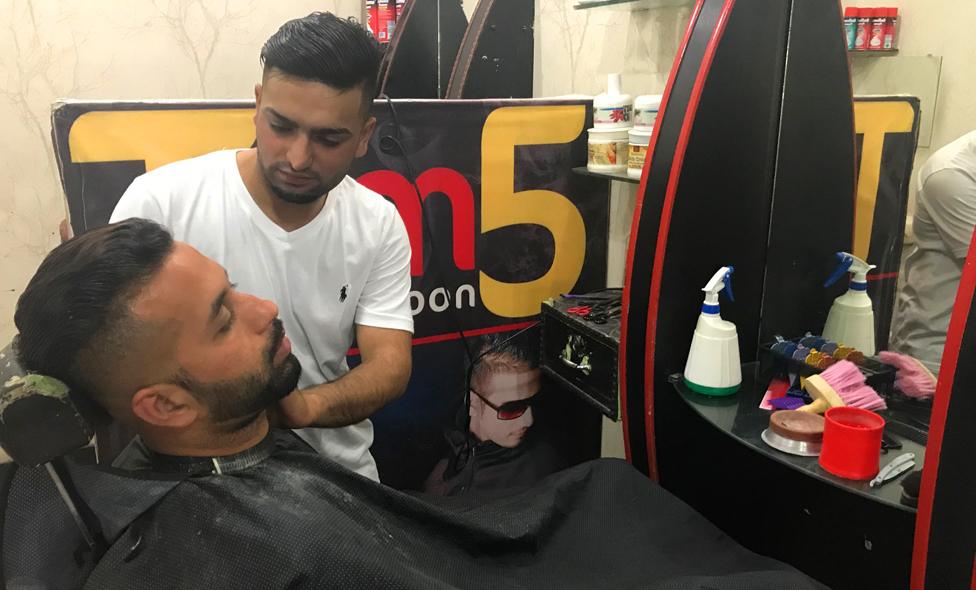The city in Pakistan that loves a British hairstyle
- Published

When BBC correspondent Secunder Kermani wanted to get a haircut in Pakistan, he decided to head to Mirpur, in Pakistan-administered Kashmir. It was the one city where he could be sure of getting the same cut he normally has in London.
As I waited outside the blast-proof walls of my hotel in Islamabad, a short, moustached security guard with a friendly face wandered over.
"Are you from the UK?" he asked in Urdu.
I told him I was. My family is originally from Pakistan, but I was born in London.
"So you're from Mirpur are you?"
I smiled - the city of Mirpur is known as Little England here, because so many of its inhabitants left for Britain, only to return to build big houses with the money they've saved - or to marry off their children.
"No, my family aren't from there," I told him.
He pointed at my head, "But your hairstyle - all the Mirpuris have the same one."
To explain - I have what's called a skin fade, the sides of my head shaved to varying degrees. Down by my ear, there's barely any hair - then it gradually gets longer as you go upwards - at the top of my head it's a normal, longer length. It's a very common cut in parts of Britain - particularly amongst British Asians. In Pakistan though, most men have much simpler hairstyles.
I wasn't sure if the security guard liked my hair. But at least, I thought, I know where I can find a good barber. My first haircut in Pakistan would be in Mirpur, I resolved.

Find out more
From Our Own Correspondent has insight and analysis from BBC journalists, correspondents and writers from around the world
Listen on iPlayer, get the podcast or listen on the BBC World Service or on Radio 4 on Thursdays at 11:00 BST and Saturdays at 11:30 BST

I was rather disappointed by Mirpur at first - it looked like most other Pakistani cities I had been to - but I got excited when I saw a sign advertising Chicken Cottage, a fried chicken brand from Britain that young British Muslims often visit as a halal alternative to McDonalds.
And it was true - every other guy there under the age of 40 seemed to be sporting a skin fade. It was impossible to tell whether they were British Pakistanis or locals.
In the 1960s, thousands of Mirpuris left to work in the factories and mills of cities like Bradford and Birmingham - some estimate that about 70% of all British Pakistanis can trace their origins to the region. Practically every household there has relatives in England, I was told, so when cousins visit from the UK young Mirpuris copy their style.
My guide was a local YouTube star - Arslan Shabir - who has built an online following in both countries.

Arslan with fans, taking a selfie
Aside from his crisp white shalwar kameez (traditional tunic and pleated trousers) he looks every inch the urban Brit. The sides of his hair are completely shaved; he has his initials tattooed on the back of his neck, a fake diamond earring, and a cheeky smile accentuated by a gold tooth. But when he opens his mouth he speaks a thick local dialect I can barely follow.
We follow him to what he says is Mirpur's premier barbers. A stylish young man is having his designer stubble plucked with tweezers - hair by hair - so the edges of his beard form a perfectly straight line. Both he and the barber also have skin fade haircuts.
Raja - the man being plucked - tells me the style may have originated in Britain, but it's now become identifiably Mirpuri, instantly recognisable. He has never been to England himself, but has relatives in Birmingham. "Do I look like a Pakistani?" he asks me, as he flicks through a gallery of selfies on his phone. "Could you tell me apart from any British kid?" He's clearly proud to look like one.

Barbers in Mirpur offer the distinctive skin fade hairstyle
But the guys here have a complex relationship with Britain. One customer tells me how he was fleeced out of a small fortune by a girl in Leeds who claimed she would marry him. Like many in Mirpur who see their relatives building large homes or businesses with their savings from Britain, he hoped he could find work in the UK. But she took his money and disappeared.
Another in the salon is due to get married in a few months - to his cousin in England.
Some of Arslan Shabir's videos criticise British Pakistanis for the way they talk about their Pakistani cousins. "Freshie" means fresh off the boat - a recent immigrant who doesn't know anything about life in Britain. "Mangy" is short for a mangetar - a fiance - in other words, someone who only got into the country because of an arranged marriage.

More from the Magazine
Mirpur's connection with Britain has made it a place quite unlike anywhere else in the region. You can see it in the huge villas. "Where could I get a place like this in the UK?" says Zahoor from Ilford, as we crane our necks to get a full view of his dazzling palatial creation, complete with terraces and towers.

Arslan says he gets on well with most British Pakistanis, and as he showed me round his hometown we were stopped by three fans from Bradford. Sauntering around with sunglasses and cigarettes and posing for pictures, they looked like they could be on a lads' holiday in Magaluf - except two of them were in shalwar kameez.
Arslan clearly loves the attention - and perhaps the validation - from these British fans. But he says he also resents those British Pakistanis who look down on their freshie or mangy cousins. "Where do they think their parents come from?" he says indignantly. "The same place as us."
Back at the barbers and it's my turn. As he brandishes an electric razor, Irfan tells me that he was the first in Mirpur to start offering skin fades. "The other day," he boasts, "a British customer was so impressed he offered me a job… in London."
Join the conversation - find us on Facebook, external, Instagram, external, Snapchat , externaland Twitter, external.